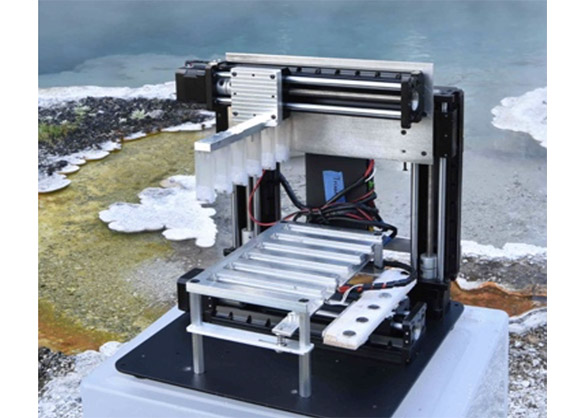Parabolic Flight Test of the Microgravity Tolerant InsTrument for Automated Nucleic acid extraction (uTitan)
PI: Kasthuri Venkateswaran, Ceth Parker (Co-I), NASA/Jet Propulsion Laboratory
PI: Kasthuri Venkateswaran, Ceth Parker (Co-I), NASA/Jet Propulsion Laboratory

- TA06 Human Health, Life Support and Habitation Systems
- TA10 Nanotechnology
The current protocol for microbial monitoring on ISS using molecular techniques involves sending samples back to terrestrial laboratories which can take up to four months after the time of collection. In order to improve microbial monitoring on the ISS and in future human missions to Mars and beyond, there needs to be an automated, streamlined, and microgravity compatible DNA extraction instrument. The omics in space team developed such an instrument and dubbed it μ-Titan (short for the micro(μ) gravity Tolerant InsTrument for Automated Nucleic acid extraction). The μ-Titan can process multiple samples simultaneously, producing real time data output, while running automatedly, and functioning at a variety of gravity levels, from 1G to Martian to the μ-gravity of space.
The majority of the system, including the robotic arm and base, chemistries of the extraction fluid and activities of magnetic particles in solution, should not be affected by microgravity conditions. The only portion that would be affected are the fluid filled wells. To mitigate this problem, microgravity compatible wells have been designed to passively hold the liquids in place. A parabolic flight, where the entire system can be tested, is the next step. Anticipated TRL after flight: TRL-6/7.
Once aboard the ISS the μTitan will be able to help complete the pipeline for “sample in answer out” microbial analysis, both testing for surfaces and water supplies aboard the station and aiding as a clinical diagnostic device.
Technology Details
-
Selection DateNASA Directed
-
Program StatusActive
- 0 Parabolic
Development Team
-
PIKasthuri Venkateswaran
-
PI Organization
-
Co-ICeth Parker
-
Co-I Organization
-
SponsorNASA
-
More Information

